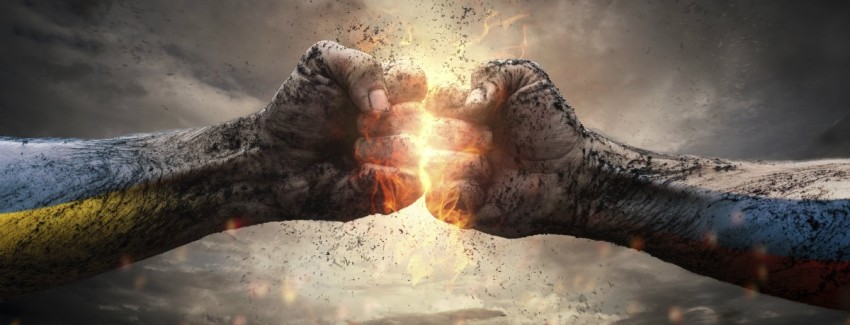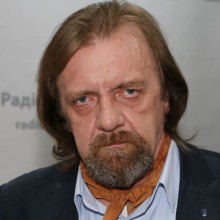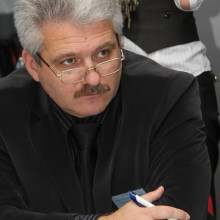Bohdan Yaremenko
Member of the Political Council of the Ukrainian Association of Patriots "UKROP"
Chairman, Maidan of Foreign Affairs Foundation
The onset of the operation on occupation of the Crimean peninsula on February 20, 2014 marked the start of Russia's armed aggression against Ukraine.
At present, despite numerous statements of the Ukrainian authorities that they have achieved remarkable heights in reforming the defense and security sector of the state, but at the same time do not see a military solution to the conflict with Russia and believe in diplomatic negotiations, the war continues with no political or diplomatic solution in sight, while the Minsk negotiation process has been completely dead. The situation demands a search for the international and domestic factors that prevent Ukrainians from restoring peace and for the ways to get out of the obvious impasse.
The modern global politics is experiencing a painful stage when the existing rules of the game are crumbling and the new ones are just emerging. The era of the block confrontation and the subsequent short historical period of the global US dominance is effectively over. New economic, political and military forces -- the European Union, China, India, Brazil and others -- are rising and to various degrees of success establishing themselves on the world stage. These complex and fragile processes and the conflict potential they inevitably entail are well understood by Russia that tries to use them to compensate for its own lack of economic and political prospects. And even such globally small political players as North Korea are trying to take advantage of the growing global contradictions in order to secure some kind of political gain or a certain status guarantee.
However, the new global rules of the game, spheres of influence and political development trends are just in the process of formation. Against the backdrop of the increased competition, struggle for resources and other global framework changes, the contradictions between states are exacerbating, the new fault lines – developing and the global security situation in the world – deteriorating, while the stakes keep going up, resulting in the escalation and the increasing number of conflicts, unrest and wars. At present, many of the pressure points, such as North Korea, Syria, the Middle East, the China-India border and other, have the potential for rupturing into full-scale regional or even world wars.
All that means that being involved against its will in that global realignment process that in our case, has taken shape of the war with Russia, Ukraine cannot count on the international community to offer it a salvation recipe, i.e. a set of conditions acceptable to Ukrainians that would guarantee the nation not even 30-50 years, but just a year or two of peaceful and safe development. The reality is that the world now is too busy with other problems, so the Ukrainian question is perceived as temporary and marginal.
That suggests that any solution to the situation around the war in Donbas is unlikely to be final or even lasting. Chances are high that whatever Ukraine gives up, the circumstances or the more aggressive neighbor will soon demand more. Meanwhile, the current economic, political, social, security and defense state of Ukraine does not lead to believe that after any and all compromises and concessions in the name of peace, the country would be able to secure it any time soon.
So, Ukraine should not be in hurry to sign up for the first-best proposal, as was the case with the Minsk agreements.
First, we need to figure out what is completely unacceptable to us under any circumstances and what realistic result would be best or at least, minimally harmful to be deemed satisfactory, and only after that -- how to best achieve it.
The Minsk agreements stipulate the return of the temporarily occupied areas of the Donetsk and Luhansk regions to Ukraine as the last order of business and only provided that the RF retains control over them. In addition, they completely ignore the Crimea issue. The war continues because Russia does not consider its goal of establishing control and dominance over Ukraine accomplished and has the resources to pursue it by military means, while Ukraine represented by President Poroshenko, had first agreed to the bonded, or rather, defeatist terms of the Minsk agreements and later failed and/or did not want to follow through.
But even if the political terms of the Minsk agreements were acceptable to Ukraine, it is unlikely they could have been fulfilled in their present form. Possibly, in the summer of 2014, it could seem to some that Donbas might be returned to Ukraine via several simple political manipulations, such as adopting several laws and holding the elections. Today, however, it is absolutely obvious that Russia's armed aggression in the East of Ukraine is a long and devastating one, and that if Ukraine is unable to resolve the situation by force at lightning speed, it would need a long transitional period of huge financial investment and a search of a political formula for the gradual, rather than instant, return of the Donbas occupied territories to Ukraine.
From this perspective, the return of the temporarily occupied territories to Ukraine is not a realistic task for today. The main goal now is to end the bloodshed, hostilities and fire and only then, begin the process of searching for the means to simultaneously resolve the Donbas and Crimea problem.
As for finding the ways to stop military operations in the East of Ukraine, there are two main problems:
- forcing Russia to assume responsibility for the armed aggression against Ukraine and
- convincing Russia that armed pressure on Ukraine is futile.
Forcing Russia to recognize its responsibility for the armed aggression against Ukraine is a task that can be accomplished only through the joint effort of our state and the international community.
To that end, Ukraine needs to:
- legally and in clear and precise terms recognize Russia as the aggressor and invading state and seek the same legal recognition on the international level, foremost, in the UN
- break diplomatic ties with the Russian Federation and carry out a consistent economic, trade, humanitarian and information policy aimed at the maximum reduction of all interaction with Russia and the states that do not support the territorial integrity of Ukraine
- introduce a special additional tax on trade with the Russian Federation and direct the proceeds to cover the costs of accommodating the IDPs and fill the special fund for the reintegration of the temporarily occupied territories
- provide the ORDLO with the same status, as Crimea and Sevastopol – that of the temporarily occupied territory; legally define the liberation and reintegration of the temporarily occupied territories a strategic task and a state policy and introduce criminal and other forms of responsibility for activities directed against the implementation of the state policy of liberation and reintegration of the temporarily occupied territories
- cease all trade and economic relations with the temporarily occupied territories
- introduce strict nation-wide sanctions against enterprises of any type of ownership that engage in trade in the temporarily occupied territories, and synchronize the effort with foreign partners
- protect the rights and interests of the citizens of Ukraine remaining in the temporarily occupied territory exclusively on the territory under the control of the Government of Ukraine. To that end, motivate citizens to permanently move to the territories under Ukraine’s control and maximally assist them in doing so. In the Ukrainian areas near the demarcation zone, facilitate all logistics for meeting all legal, financial, social, informational, cultural and other needs of the IDPs, as well as granting them privileged opportunities for secondary and tertiary education
- in accordance with the Constitution of Ukraine and in the manner prescribed by the law of Ukraine, declare martial law in the temporarily occupied territories and transfer the command of the military operation in the east of Ukraine to the General Staff of the Armed Forces of Ukraine
- introduce a state of emergency in the territories adjacent to the zone of combat operations
- pursuant to paragraph 1 of Article 61 of the Law of Ukraine "On the National Guard of Ukraine," transfer the detachments and units of the NGU required for conducting the military operation in the East of Ukraine to the Ministry of Defense of Ukraine
- begin official prosecution of all persons involved in collaborationism in any form, resulting in the appropriate verdicts and execution thereof, including by the special operations forces
- grant amnesty to those who have transferred Russian occupation troops’ war criminals and persons engaged in terrorist activity in the temporarily occupied territories to the Ukrainian authorities
- activate negotiations on and ensure the deployment of the international peacekeeping/coalition forces at the uncontrolled section of the Ukrainian-Russian border
- remove all legal barriers to Ukraine's membership in the North Atlantic Treaty Organization
- initiate international missions on reconstruction of the liberated areas of the Donetsk and Luhansk regions with the creation of the relevant trust funds
- start developing a human resource reserve and actively train personnel -- mostly from the internally displaced persons -- of the administrations of cities and towns that will be freed from the occupation
- transfer the control over the demarcation line with the temporarily occupied territories to the Armed Forces of Ukraine, the Security Service of Ukraine and the National Guard, eliminating all types of border and customs control
- prohibit civil servants, servicemen and those in equivalent positions, as well as members of their families, from traveling to the Russian Federation and its allies, as well as to the temporarily occupied territories, except to perform their official duties; warn citizens of Ukraine about the inexpediency of travel to the Russian Federation and its allies and the lack of or limited capability to protect their rights and interests in the territory of the respective states; introduce a ban and liability for political parties, public organizations and media for the use of funding by or originating from the Russian Federation and its allies
- prepare and submit to the international judicial institutions a consolidated lawsuit in regard to Russia's armed aggression against our state.
In view of the above, the task of the Ukrainian diplomacy should be to coordinate efforts with the friendly states in order to:
- ensure compliance with and enforcement of the existing sanctions and restrictive measures against the Russian Federation, as well as their expansion. The possible areas for new measures of influencing the Russian Federation may be arms trade and maritime and aviation industries. The expansion of the sanctions mechanisms may include bilateral and multilateral agreements on monitoring of the international and national sanctions against the Russian Federation and on prosecuting violators of these sanctions jointly with Georgia, Moldova, friendly EU states and other countries
- intensify the active counter-propaganda and monitoring of the Russian collaborators and agents of influence in different countries of the world and the information coverage of the consequences of the Russian aggression in Ukraine,
- conduct a comprehensive diplomatic war with the Russian Federation by countering Russian initiatives and interests in the world
- maintain the principled position on negotiating with the Russian Federation exclusively through international mediation in the territory of the countries neutral or friendly to Ukraine and not of the Russian satellite states; refuse any contacts or negotiations with representatives of the occupation administrations of the so-called DNR and LNR, except for the urgent humanitarian problems, i.e., freeing hostages, overcoming the consequences of man-made or natural disasters that could affect the territory of Ukraine, providing humanitarian corridors for the passage of Ukrainian citizens through the demarcation line, etc.
- monitor, inform and direct constant attention of the world community to the human rights situation in the temporarily occupied territories and in the Russian Federation in general; continuously monitor and inform the world community about the Russian militarization and use of the temporarily occupied territories for aggressive conflict and destabilization of the situation in different regions of the world
- create infrastructure for advocacy activities on the territory of the Russian Federation and its satellites that would counter the ideology of the "Russian World" and any distorted interpretations of history, especially of the World War II, and would encourage self-consciousness of peoples and ethnoses living in the territory of Russia and its satellite states.
As for coercing the Russian Federation to give up military means of battling Ukraine, the Ukrainian diplomacy should:
- actively seek and establish allied relations with foreign states
- ensure permanent presence of the friendly states troop contingents, in particular of the NATO member countries, by conducting in the territory of Ukraine a regular series of operational and tactical joint international exercises and training of troops under the auspices of NATO and the EU
- ensure access to technology, materials and products for defense and dual use; attract investments into the domestic defense industry and facilitate the creation of joint ventures, foremost, with manufacturers from the United States and other NATO member states, for the production of weapons and equipment for the national defense and security
- draw constant attention of the international community to the lack of security guarantees to the non-nuclear-weapon states
- introduce initiatives that expand the possibilities of effectively countering hybrid aggression
- direct the attention of the world community to the consequences of the aggressive militaristic foreign policy of the Russian Federation towards Georgia, Moldova and other states.
At the same time, it is obvious that the lion's share of that effort has to be accomplished by other means. Convincing the Russian Federation of the futility of aggression not only in the temporarily occupied territories, but against Ukraine in general, requires realizing a set of tasks to ensure the country's defense capability, namely:
- through support of and collaboration with partners, create conventional non-nuclear deterrence systems that if necessary, would be able to inflict unacceptable losses and destruction on the enemy, forcing him to abandon aggressive plans for the beginning or escalation of a large-scale armed aggression against Ukraine. If necessary, withdraw from the international treaties limiting Ukraine's ability to develop and manufacture reconnaissance-strike systems, including satellite-based ones
- when purchasing armaments for the Navy and Air Force, give preference to West European and American manufacturers via offset and leasing agreements
- develop the command and control of the Armed Forces of Ukraine and other national military units into a single system, ensuring its integration with the NATO Force Integration Units
- using the experience of the Ukrainian-Polish-Lithuanian Brigade, step up efforts to create international military units, facilitating their headquarters and command and control center operation on the territory of Ukraine
- provide continuous long-range radar detection and control patrolling of the allies in the airspace of Ukraine and integration of the national air defense system into the NATO Integrated Air and Missile and Defense System
- ensure legal admission of foreign manufacturers to the national tenders on procurement of arms, military-technical products and defense-related services
- restore the domestic closed cycle production of armored and aircraft equipment
- facilitate production of modern rocket-artillery systems and all the necessary types of ammunition
- make sure that any decisions on the development, modernization or rearmament of the Armed Forces of Ukraine stipulate that the innovations are consistent with the NATO standards, even if the membership prospect in the Alliance remains ambiguous -- full compatibility with the armed forces of the NATO states should be one of the goals of the Ukrainian Armed Forces development
- create a flexible system of territorial defense with the maximum involvement of volunteers and local authorities
- shift the budgeting priority from the National Guard and the Ministry of Internal Affairs units to the Armed Forces of Ukraine
While the fulfillment of the above tasks requires a longer period of time, Ukraine’s approach to waging the war must change now. The Armed Forces of Ukraine should carry out active defense and reconnaissance, prevent the enemy's aggressive actions and create real dangers for him. In the event of the enemy’s attempts to escalate aggression against Ukraine from its temporarily occupied territories, the Armed Forces of Ukraine must strike preemptively and occupy the footholds used for violating the ceasefire, which would reduce the military and diplomatic risks for Ukraine. In the Ukrainian territory, the occupant should lose any sleep, as well as any hope for victory.
For the next one to two years, the minimum realistic task is to force the enemy to stop the hostilities. With that, the maximum realistic achievement would be to have the Russian Federation, in addition to signing a contractual agreement on ceasefire via international mediation, also consent to the negotiations on the issue of Donbas and Crimea.
Such algorithm of actions and approaches would make the topic of the Minsk agreements implementation obsolete and would allow for the development of new political agreements on peace and the return of territories -- the agreements that Ukraine has already made all possible concessions for, paying with the lives of more than ten thousand of its sons and daughters.
Unfortunately, there is no magic recipe for the ceasefire and especially, for the return of the temporarily occupied territories to Ukraine. The implementation of the proposed scenario would certainly require time, effort and further sacrifices on part of the Ukrainian people.
Clearly, for that effort to succeed, the nation should be mobilized and highly motivated to defend the state. Therefore, for now, the most important task in that regard is to restore the national unity and the citizens' trust to the political leadership.
Restoring that trust, however, is impossible without:
- reexamining the foundations of the Ukrainian state and recognizing that social disparity, poverty, violation of citizens' rights and usurpation of power, without any doubt, are the main real threats to its existence
- changing the very essence of the governance system in Ukraine and understanding that the mandate of the authorities is not to manage and control, but rather to ensure the unity of the people and the conditions for prosperity, to serve the interests of citizens, as well as to set the standards for social contracts and guarantee compliance by all the parties
- giving up any tolerance for corruption. Those caught have to be deprived not only of all property, but also, of certain civil rights, while those who bribe government officials -- of the licenses for any economic and commercial activity
The implementation of the proposed approaches cannot be carried by any single political party or civil movement, as they require broad political consensus and a profound united effort. Therefore, the "Ukrainian Association of Patriots - UKROP" does not intend to monopolize the program, but instead, is calling for its widest possible discussion and a coalition of patriotic forces for its realization.













